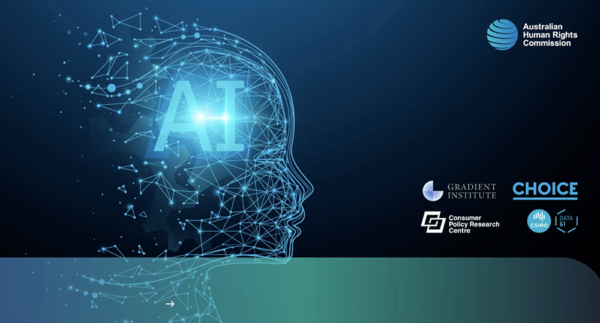Media Hub

A ground-breaking new technical paper demonstrates how businesses can identify algorithmic bias in artificial intelligence (AI), and proposes steps they can take to address this problem.
With companies increasingly using AI for decision making in everything from pricing to recruitment, Addressing the problem of algorithmic bias explores how these decision-making systems can result in unfairness.
The technical paper also offers practical guidance for companies to ensure that when they use AI systems, their decisions are fair, accurate and comply with human rights.
The paper, a first-of-its-kind in Australia, is the result of a collaboration between the Australian Human Rights Commission and Gradient Institute, Consumer Policy Research Centre, CHOICE and CSIRO’s Data61.
“Human rights should be considered whenever a company uses new technology, like AI, to make important decisions,” said Human Rights Commissioner Edward Santow.
“Artificial intelligence promises better, smarter decision making, but it can also cause real harm. Unless we fully address the risk of algorithmic bias, the great promise of AI will be hollow.”
Algorithmic bias can arise in many ways. Sometimes the problem is with the design of the AI-powered decision-making tool itself. Sometimes the problem lies with the data set that was used to train the AI tool. It often results in customers and others being unfairly treated.
“The good news is that algorithmic biases in AI systems can be identified and steps taken to address problems,” said Bill Simpson-Young, Chief Executive of Gradient Institute.
“Responsible use of AI must start while a system is under development and certainly before it is used in a live scenario. We hope that this paper will provide the technical insight developers and businesses need to help their algorithms operate more ethically.”
“Effective enforcement and strong protections are needed for Australian consumers, who expect their data to be used fairly,” said Lauren Solomon, CEO of the Consumer Policy Research Centre.
“Businesses should ensure the lawful and responsible use of the decision-making tools they use and this new technical paper highlights why that is so important.”
“Businesses should proactively identify human rights and other risks to consumers when they’re using artificial intelligence systems,” said Erin Turner, Director of Campaigns at CHOICE.
“Good businesses go further than the bare minimum legal requirements. They think about consumer outcomes at every step to ensure they act ethically and that they retain the trust of their customers.”
“Organisations need to take a responsible approach to AI,” said Jon Whittle, Director at Data61, the data and digital specialist arm of Australia’s national science agency, CSIRO.
“This includes the rigorous design and testing of the algorithms and datasets, but also of software development processes as well as proper training in ethical issues for technology professionals. This technical paper contributes to this critically important area of work and complements well other initiatives such as Data61’s AI Ethics Framework.”
The technical paper is available for download below.
An interactive infographic explaining how historical bias can arise in AI systems is also available on the Australian Human Rights Commission website.
For more information and interviews with the Human Rights Commissioner, contact:
Liz Stephens 0430 366 529 liz.stephens@humanrights.gov.au
Consumer Law
September 12, 2024
While there are some positive developments the fragmented approach potentially leaves crucial gaps in protecting Australians' digital rights.
Consumers in digital world
June 05, 2024
Recently, trusted Government departments have celebrated the reported downturn in financial losses from scams in Australia. Sounds good, right? We are all getting savvier, we are all onto scammers. Or are we? I recently had a brush with a scammer which got me thinking about these reports and what the numbers mean.